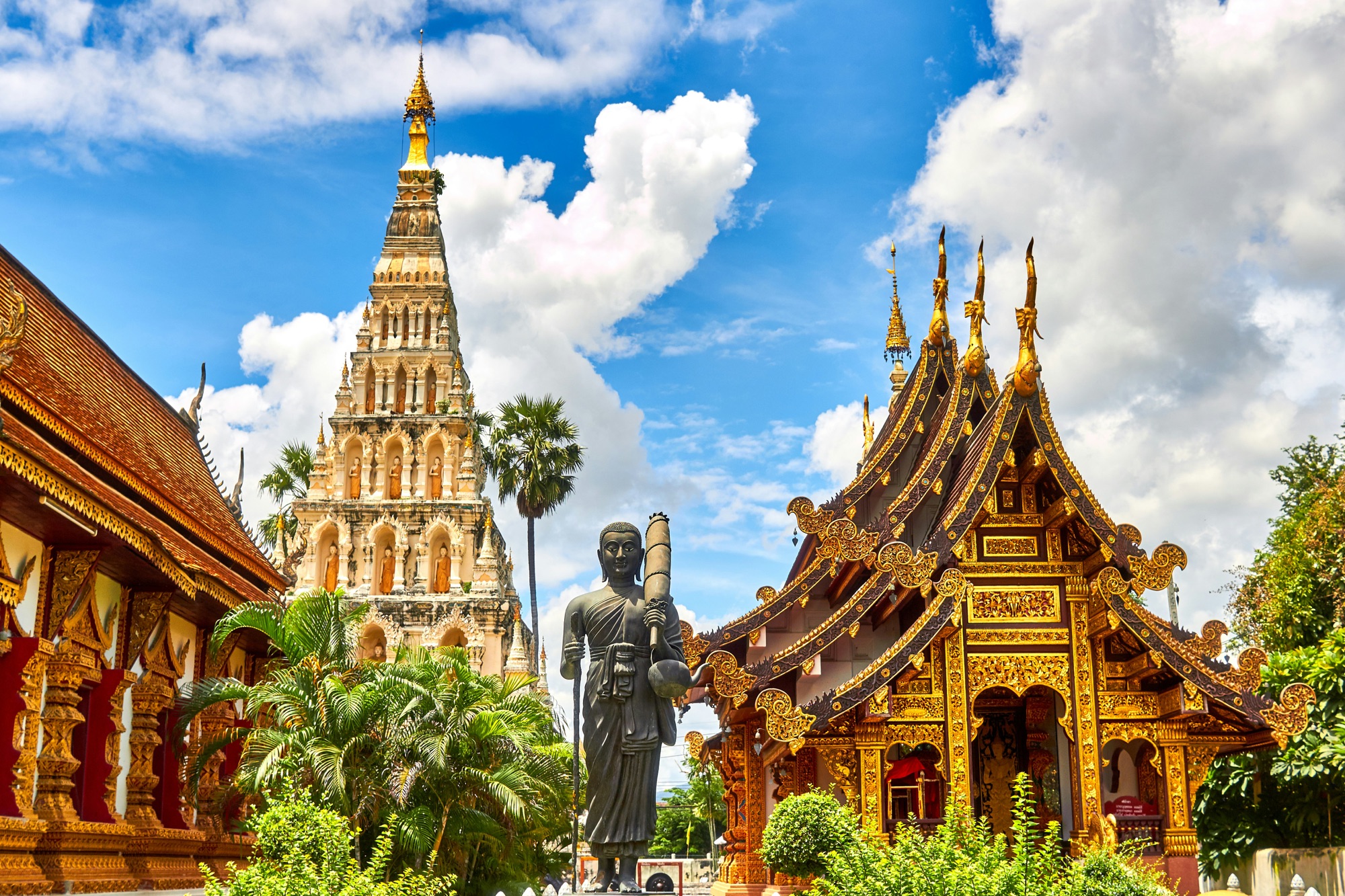Thailand, known as the “Land of Smiles,” is one of the most popular destinations in Southeast Asia, offering a blend of tropical beaches, bustling cities, rich culture, and ancient temples. Whether you’re exploring the vibrant streets of Bangkok, relaxing on the beaches of Phuket and Koh Samui, or discovering the historical ruins of Ayutthaya, there are a few key things you should know to make the most of your trip. Here are 15 essential things Americans should know before traveling to Thailand.
1. Respect for the Monarchy Is Vital
Thailand has a deep reverence for its monarchy, and it’s important to show respect toward the royal family. You’ll see portraits of the king and royal family members in public places, and any form of criticism or disrespect toward the monarchy is not tolerated and is actually illegal under Thailand’s strict lese-majeste laws.
If you’re at a public event or in a movie theater and the national anthem plays, it’s customary to stand in respect. Avoid any conversations that criticize the royal family, as this can have serious legal consequences.
2. Thai People Are Very Polite and Value Respect
Politeness and respect are core values in Thai culture, and social interactions are often defined by hierarchy and deference. The common Thai greeting, the “wai”, is a gesture of respect that involves placing your hands together in a prayer-like position and slightly bowing your head. Thais often greet each other this way, and it’s polite to return the gesture.
In general, Thais avoid open conflict, and it’s considered rude to lose your temper or raise your voice in public. Remaining calm and composed, even in stressful situations, is a sign of good manners.
3. Dress Modestly, Especially at Temples
While Thailand is a tropical country with warm weather, modest dress is important, especially when visiting temples (known as wats) or religious sites. Both men and women should wear clothing that covers their shoulders and knees when entering temples. Some temples may provide scarves or sarongs for those who need to cover up, but it’s best to plan ahead and dress appropriately.
Also, when entering a temple, always remember to remove your shoes before stepping inside. This custom extends to some homes and even certain businesses, so be mindful of shoe removal signs.
4. The Thai Baht Is the Official Currency
The official currency of Thailand is the Thai baht (THB). While credit cards are widely accepted in major cities and tourist areas, cash is still king in many places, especially in rural areas, local markets, and smaller businesses. It’s a good idea to always carry some cash for everyday purchases, including taxis, street food, and local attractions.
ATMs are easy to find in cities and tourist destinations, but keep in mind that foreign cards may incur withdrawal fees. It’s best to withdraw enough baht to last a few days to avoid repeated fees.
5. Be Prepared for the Weather
Thailand has a tropical climate, with hot, humid weather for most of the year. The country experiences three main seasons: the hot season (March to June), the rainy season (June to October), and the cool season (November to February). The cool season is considered the best time to visit, as temperatures are more moderate and there’s less rainfall.
However, even during the cool season, temperatures can still be warm, especially in southern regions. Pack lightweight, breathable clothing and always carry an umbrella or rain jacket if you’re visiting during the rainy season, as downpours can be sudden and heavy.
6. Street Food Is Safe and Delicious
Thailand is famous for its vibrant street food culture, and sampling local dishes from street vendors is a must for any visitor. Popular dishes like pad thai, som tam (papaya salad), satay, and mango sticky rice can be found on nearly every corner, especially in bustling cities like Bangkok and Chiang Mai. Thai street food is generally safe to eat, as it is freshly prepared in front of you.
To minimize any risk of an upset stomach, look for stalls that are busy with locals, as this often indicates the food is fresh and popular. Avoid eating raw or undercooked seafood or meat unless you’re at a reputable establishment.
7. Tipping Is Appreciated but Not Expected
Tipping in Thailand is not obligatory, but it is appreciated for good service. In more touristy areas or upscale restaurants, leaving a 10% tip is common, especially if a service charge is not already included in the bill. For street food vendors and smaller establishments, it’s enough to simply round up the bill or leave some small change.
In hotels and with tour guides, it’s customary to leave a small tip, and for taxi drivers, rounding up the fare is standard practice.
8. Use a Tuk-Tuk, but Know How to Bargain
The iconic tuk-tuks, or three-wheeled motorized vehicles, are a popular mode of transportation for short distances in Thai cities. Riding in a tuk-tuk can be a fun and memorable experience, but prices are often negotiable, especially in tourist areas. Bargaining is part of the experience, so be sure to agree on the fare before starting your journey.
While tuk-tuks are a fun way to get around, they’re not always the most practical. For longer journeys, taxis or using ride-hailing apps like Grab (Thailand’s equivalent to Uber) are more comfortable and often less expensive.
9. Public Transportation Is Efficient
Thailand has an efficient and affordable public transportation system, especially in major cities like Bangkok. The Bangkok Skytrain (BTS) and the Mass Rapid Transit (MRT) are great ways to avoid traffic and navigate the city quickly. Public buses and the riverboat system are also common modes of transportation, offering scenic routes along Bangkok’s Chao Phraya River.
If you plan to travel between cities or explore Thailand’s islands, domestic flights, long-distance buses, and train services are widely available and affordable. Booking in advance, especially during peak travel seasons, is recommended.
10. Beware of Tourist Scams
While Thailand is generally a safe country for travelers, like any popular destination, there are a few common tourist scams to be aware of. One common scam involves tuk-tuk or taxi drivers offering to take you on a “tour” of the city for a very low price, only to take you to gem shops or other places where they receive commissions. Always be cautious of anyone offering deals that seem too good to be true.
Another scam involves individuals at temples or tourist sites claiming that a certain attraction is “closed” and offering to take you elsewhere. Always check opening hours yourself or consult your hotel staff before believing someone on the street.
11. Understand Thai Customs Regarding the Head and Feet
In Thailand, the head is considered the most sacred part of the body, while the feet are viewed as the lowest and least respectful. You should avoid touching anyone’s head, including children, as this can be seen as disrespectful. Likewise, pointing your feet at people or religious objects is considered impolite.
When sitting, avoid pointing your feet toward Buddha statues or other religious icons, and don’t rest your feet on tables or chairs. In some temples, it’s customary to sit with your feet tucked under you to show respect.
12. Thailand Is Home to Stunning Temples
Thailand has thousands of beautiful Buddhist temples, or wats, and they are an integral part of the country’s culture and spiritual life. When visiting temples, it’s important to dress appropriately, covering your shoulders and knees. As mentioned earlier, you’ll need to remove your shoes before entering temple buildings, and you should be mindful of your behavior while on temple grounds. Avoid speaking loudly, and be respectful of monks and worshippers.
Many famous temples, such as Wat Phra Kaew in Bangkok and Wat Pho (home to the reclining Buddha), are located in bustling tourist areas, so it’s important to maintain a respectful demeanor despite the crowds. When taking photos, be sure to check for signs indicating whether photography is allowed, especially inside temple buildings.
13. Be Mindful of Thai Buddhism
Buddhism plays a major role in Thai culture, and you’ll encounter images of Buddha everywhere—from small shrines in homes and businesses to large statues in temples. It’s important to show respect toward these religious symbols. Climbing on or touching Buddha statues is considered highly disrespectful, and buying souvenirs or trinkets that depict Buddha inappropriately, such as kitschy items, should be avoided.
Monks, who are highly revered in Thai society, should be treated with respect. If you are a woman, avoid touching or handing anything directly to a monk, as monks are forbidden from physical contact with women. If you wish to give something to a monk, place the item on a cloth or offer it to a male intermediary.
14. Thailand Is Known for Festivals and Events
Thailand is home to many vibrant festivals and cultural events, and if you time your visit well, you can witness or even participate in these celebrations. One of the most famous festivals is Songkran, the Thai New Year celebrated in April, known for its massive water fights in the streets. This festival is a lot of fun but expect to get wet as people douse each other with water to symbolize cleansing and renewal.
Another key festival is Loy Krathong, typically held in November, where people release beautifully decorated krathongs (small floating baskets) onto rivers to pay respect to the water spirits and release negativity. Watching the night sky fill with floating lanterns and waterways sparkle with candle-lit krathongs is a magical experience.
15. The Best Time to Visit Is During the Cool Season
The ideal time to visit Thailand is during the cool season, from November to February, when temperatures are more moderate, and humidity is lower. This period is perfect for exploring temples, visiting markets, or relaxing on the beaches. However, because it’s the peak travel season, expect more crowds and higher accommodation prices.
The rainy season (June to October) can be less predictable, with heavy showers common, but it’s also a great time to experience the lush green landscapes, fewer tourists, and discounted hotel rates. The hot season (March to May) can be sweltering, especially in cities like Bangkok, so if you’re traveling during this time, focus on beach destinations or cooler northern areas like Chiang Mai.
Conclusion
Thailand is a beautiful and diverse country that offers everything from bustling city life to serene temples and tropical beaches. Understanding the local customs and respecting Thailand’s rich cultural traditions will help you enjoy a smooth and immersive travel experience. Whether you’re exploring ancient temples, enjoying street food, or relaxing on the islands, Thailand’s unique blend of warmth, culture, and hospitality will make your trip unforgettable. By being mindful of the etiquette and embracing the Thai way of life, you’ll have an enriching and fulfilling adventure in the Land of Smiles.




